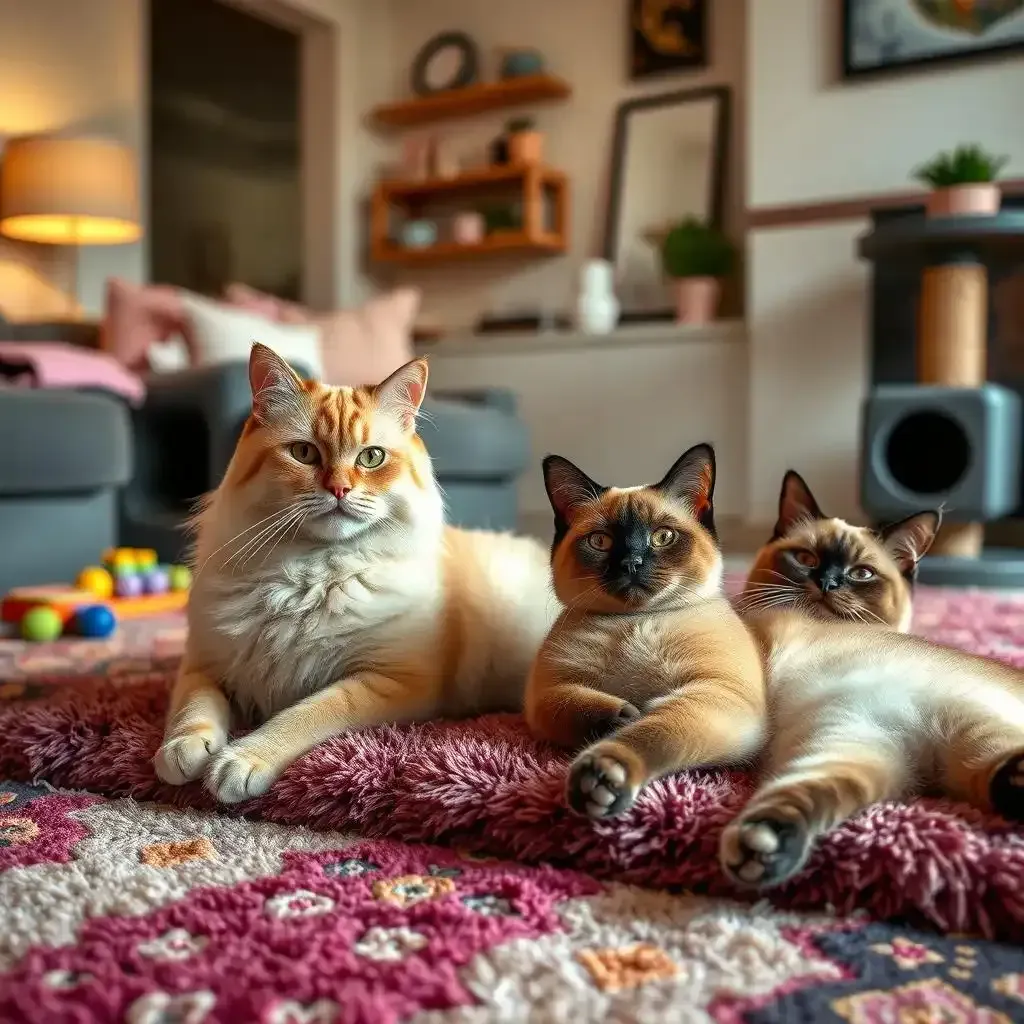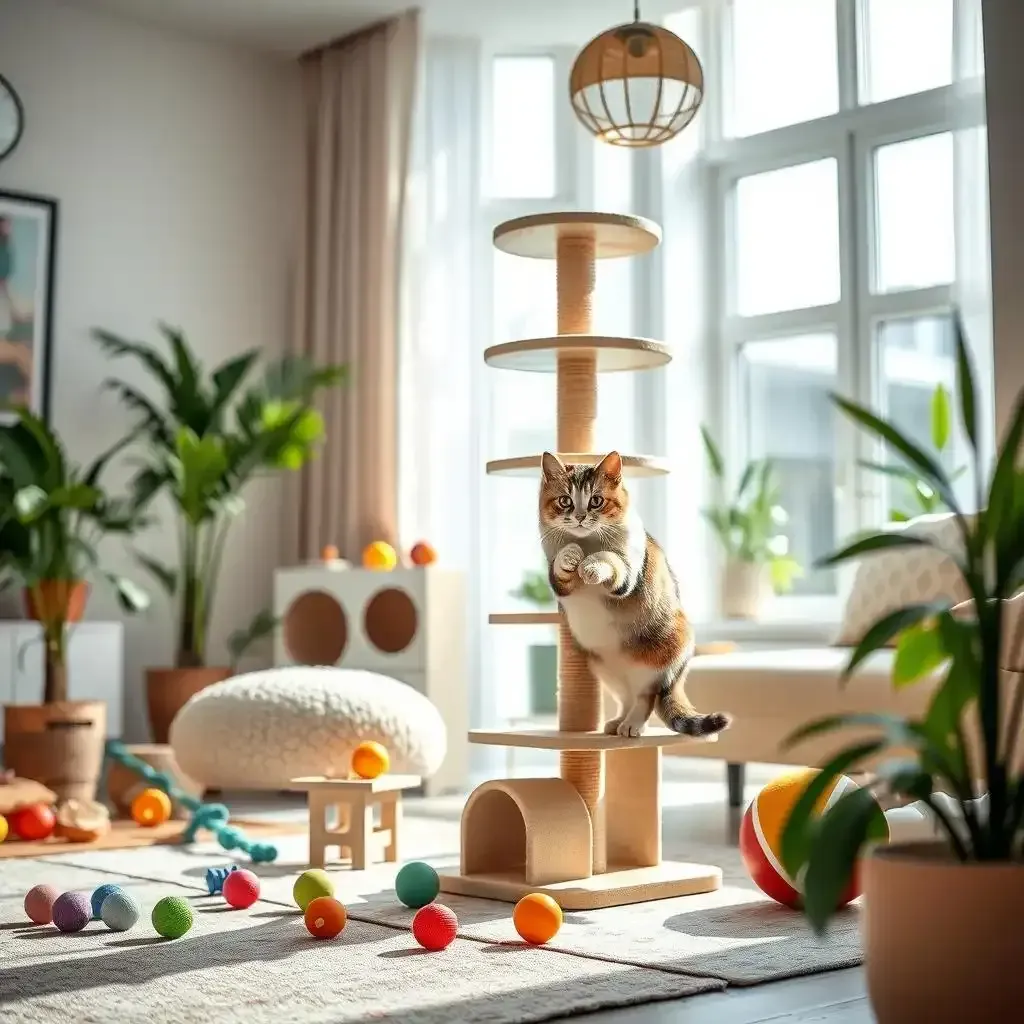Table of Contents
Thinking about welcoming a furry friend into your home? Choosing a cat is a big decision, and if you're planning on keeping your cat indoors, that decision becomes even more important. Not all breeds are created equal when it comes to indoor living. Some cats thrive in the cozy confines of a house, while others may pine for the great outdoors. This guide will help you guide the world of feline breeds and find the perfect match for your lifestyle. At kittentoyland.org, we believe that every cat deserves a loving home, and that starts with finding the right breed for your indoor environment. We’ll explore some breeds known for their indoor adaptability, discuss the unique needs of indoor cats, and help you make an informed decision that ensures a happy and healthy life for both you and your new feline companion. Get ready to uncover the best indoor cat breeds and find the purrfect friend for your home!
Best Indoor Cat Breeds: Choosing the Purrfect Companion for Your Home

Best Indoor Cat Breeds Choosing The Purrfect Companion For Your Home
Meet the Chill Cats: Low-Maintenance Breeds
So, you're thinking about getting a cat, huh? Smart move! But if you're planning on keeping your kitty indoors, you gotta choose wisely. Some cats are total couch potatoes, happy to chill out and snuggle, while others are like little furry tornadoes, needing acres of space to zoom around. For the indoor life, you want a breed known for its calm and relaxed nature. Think of it like this: would you rather have a super energetic puppy who needs constant walks, or a cuddly dog who's happy to nap by the fire? For many people, a calm cat fits the bill perfectly. We're talking about breeds that are naturally adaptable to smaller spaces and don't need a ton of outdoor adventures to be happy. The British Shorthair, for example, is famous for being super chill and easygoing. They’re like the zen masters of the cat world! And Ragdolls? Don't even get me started – those guys are basically furry, purring teddy bears. They're super friendly and low-maintenance, making them perfect indoor companions. For more info on choosing toys, check out our guide on best cat toys.
Breed | Temperament | Grooming Needs |
|---|---|---|
British Shorthair | Calm, affectionate | Low |
Ragdoll | Friendly, laid-back | Moderate |
The Playful but Adaptable: Cats Who Love Indoor Fun
Now, don't get me wrong – just because a cat's an indoor cat doesn't mean it has to be a total sleepyhead! Some breeds are naturally playful and affectionate, thriving even without access to the great outdoors. Think of the Siamese cat – they’re known for their playful and talkative personalities. They're like little furry comedians, always ready for a game of chase or a good cuddle. They're incredibly social and love being around their humans, so they'll happily spend their days playing with toys, exploring their indoor territory, and generally being adorable. Russian Blues are another great example; they're known for their easygoing personalities and are content with moderate attention. They are independent but not aloof, and they're not going to drive you crazy demanding walks or constant playtime. If you're looking for a breed that's both playful and adaptable, a Siamese or a Russian Blue might be your perfect match. Want to learn more about choosing the right toys for playtime? Check out our post on best cat toys for engagement.
- Siamese: Vocal and playful
- Russian Blue: Calm and affectionate
- Maine Coon: Gentle giants (need lots of space!)
Understanding Your Lifestyle: Finding the Best Indoor Cat Breed for YOU
Your Home, Your Cat: Space and Activity Level
Okay, let's talk about *you*. Seriously! Picking the right indoor cat isn't just about finding a fluffy friend; it's about finding a cat whose personality matches your lifestyle. Do you live in a tiny apartment, or do you have a sprawling house with plenty of room to roam? A super energetic cat might drive you crazy in a small space, bouncing off the walls (literally!). But a quiet cat in a huge house might feel lonely. Imagine a tiny kitten in a massive mansion – it’d be like me trying to play basketball with Shaq! It's all about finding the right fit. Think about how much time you can dedicate to playtime and cuddles. Some cats are total attention hogs, while others are more independent. If you work long hours, a more independent breed like a Russian Blue might be a better choice than a Siamese, who's known for wanting to be involved in EVERYTHING you do! For more ideas on keeping your cat happy indoors, check out our guide on best indoor cat toys.
Lifestyle | Best Cat Breed Type |
|---|---|
Busy, less playtime | Independent breeds (e.g., Russian Blue) |
Lots of free time, active | Playful breeds (e.g., Siamese) |
Grooming: Are You Ready for the Shedding?
Next up: grooming! Some cats are low-maintenance, needing only a quick brush now and then. Others, well, let's just say they're fluffier than a cloud after a snowstorm! Long-haired breeds like Ragdolls require more regular brushing to prevent mats and tangles, which means you'll need to dedicate some time to keeping them looking their best. Think of it like this: a short-haired cat is like a low-maintenance car – easy to clean and care for. A long-haired cat is more like a classic car – beautiful, but it needs more attention. If you're not prepared for regular grooming sessions, a short-haired breed might be the better option. Want to explore more cat toy options? Take a look at our selection of .
- Short-haired: Less grooming needed
- Long-haired: Requires more brushing
- Consider your time commitment
Personality Match: Finding Your Feline Soulmate
Finally, and this is super important: personality! Cats, just like people, have different personalities. Some are cuddly and love to snuggle, while others are more independent and prefer their own space. Some are playful and energetic, while others are more laid-back. Do you want a cat who'll follow you around like a shadow, or one who'll happily nap in a sunbeam while you work? Think about your own personality and what kind of cat you'd enjoy having as a companion. A cat who's too energetic for you might lead to frustration, and a cat who's too independent might leave you feeling lonely. It's all about finding a balance. Maybe you'd love exploring our range of to help your cat feel stimulated and happy.
"The best cat is the one that fits your life, not the other way around." - Anonymous Cat Lover
Beyond Breed: Essential Considerations for Indoor Cats

Beyond Breed Essential Considerations For Indoor Cats
Enrichment: Keeping Your Indoor Cat Happy and Stimulated
Okay, so you've picked a breed that *should* be happy indoors. But even the chillest cat needs mental and physical stimulation! Think of it like this: you wouldn't want to sit in a boring room all day, right? Cats are the same! Indoor cats need toys, climbing structures, and places to hide. A simple cardboard box can be a cat's paradise! They love exploring, playing, and even just having a good nap in a comfy spot that feels "theirs." It's all about creating an interesting environment for your cat. You can even make your own cat toys! Check out our guide on DIY cat toys for some inspiration.
- Lots of toys – variety is key!
- Climbing structures (cat trees are awesome!)
- Scratching posts (essential for their claws)
Health and Wellness: Vet Visits and Special Needs
Just like us, cats need regular check-ups! Even if your cat seems perfectly healthy, annual visits to the vet are crucial. Early detection of health problems can make a huge difference. Plus, your vet can advise you on the best food and care for your cat's specific needs. If you're adopting a cat, remember that some cats might have special needs. Maybe they need a special diet or extra attention. It’s important to be prepared for anything. Don't forget to check out our guide on finding local pet stores for all your cat's needs!
Health Concern | Solution |
|---|---|
Weight gain | Regular exercise and healthy food |
Dental issues | Brushing teeth, dental chews |
Final Thought
Ultimately, the best indoor cat for you depends on your lifestyle, living space, and personality. While breed can be a helpful starting point, remember that every cat is an individual. Spend time researching different breeds, consider adopting from a shelter or rescue organization, and most importantly, prepare to give your new furry friend all the love and attention they deserve. Happy cat parenting!